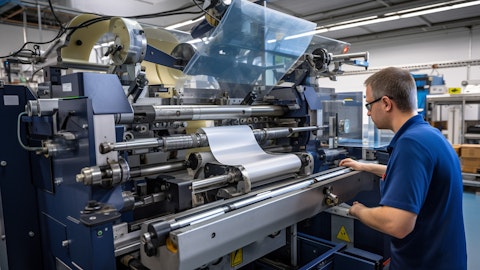SES AI Corporation (NYSE:SES) Q1 2025 Earnings Call Transcript April 25, 2025
Operator: Hello everyone and welcome to the SES AI First Quarter 2025 Earnings Release and Call. My name is Nadia and I’ll be coordinating the call today. [Operator Instructions] I will now hand over to your host, Kyle Pilkington, Chief Legal Officer to begin. Kyle, please go ahead.
Kyle Pilkington: Hello everyone, and welcome to our conference call covering our first quarter 2025 results. Joining me today are Qichao Hu, Founder and Chief Executive Officer, and Jing Nealis, Chief Financial Officer. We issued our shareholder letter yesterday afternoon after market closed, which provides a business update, as well as our financial results. You’ll find a press release with a link to our shareholder letter in today’s conference call webcast in the investor relations section of our website at ses.ai. Before we get started, this is a reminder that the discussion today may contain forward-looking information or forward-looking statements within the meaning of applicable securities legislation. These statements are based on our predictions and expectations as of today.
Such statements involve certain risks, assumptions, and uncertainties, which may cause our actual or future results and performance to be materially different from those expressed or implied in these statements. The risks and uncertainties that could cause our results to differ materially from our current expectations include, but are not limited to, those detailed in the latest earnings release and in our SEC filings. This morning, we will review our business as well as results for the quarter. With that, I’ll pass it over to Qichao.
Qichao Hu: Thanks, Kyle. Good morning and thank you for joining us on our first quarter 2025 earnings call. In the first quarter, SES AI achieved a new record for revenue with $5.8 million. This was a great start to what we expect will be a transformational year for SES AI. In addition, we have announced a battery materials discovery software and service platform. And on April 29, we will be launching our molecular universe demonstration at 11:00 a.m. You can find more details on our website. First EV, during the first quarter, we booked revenue from contracts with two OEM partners to develop AI enhanced lithium metal and lithium ion batteries for EVs. And some highlights include we are on track to complete Bsample and in discussion about commercial next steps with two OEMs. We have deployed our AI for Science material discovery end-to-end capability to develop new electrolytes to improve critical battery performance measures such as cyclized and safety of lithium metal and silicon lithium ion batteries for two OEMs. And based on the successful track record for these two OEMs, we are packaging our AI for Science material discovery end-to-end capability into a software and service platform called Molecular Universe.
This allows us to mass produce material discovery and development service, our largest and most profitable revenue component, enabling us to rapidly expand our service from just one chemistry and only two OEMs in one market to potentially all OEMs, all battery makers, all electric companies, consumer electronics companies, and many more across all battery chemistries. And with fierce global EV competition and new safety regulations, through our material discovery and development services, we can deliver commercially practical winning solutions that help OEMs differentiate. And even before the global release of Molecular Universe, there are already one dozen companies, including OEMs, battery and electronic companies, doing early access testing.
And now to UAM, drones and robotics. I’m very excited about the tremendous response we have received following our introduction of the AI-enhanced 2170 cylindrical cell for humanoid robotics and drones applications. We also pouch cells for customers in drones and UAM from our own lines that were previously converted from EV A-sample lines. In particular, the strategic value of our facility in Chungju, South Korea, has proven to be particularly valuable to many of our customers, given the current geopolitical uncertainty and tariff tension. Also, these cells use the electric materials discovered through Molecular Universe. I’d like to turn to the upcoming launch of our Molecular Universe software and service platform, as I mentioned, will be released on April 29.

The motivation for Molecular Universe is to mass produce Material Discovery and Development Service, our largest and most profitable revenue component. This platform delivers commercially practical winning solution that help users compete. Molecular Universe is not contract R&D, rather it’s an end-to-end service ranging from material discovery to cell manufacturing. It is A sample, B sample, C sample, SOP at scale. Its benefits are not just applicable to one chemistry, lithium metal, and one market EV, but can be applied to all battery chemistries and all battery markets. We will have the global release of the first version of Molecular Universe, MU0, on April 29. The live demo will explain MU0’s features and pricing structures. We look forward to reporting more progress and details on the Molecular Universe during the second quarter.
To close, I would like to highlight some of our plans for 2025 and beyond. First, we are in a strong cash position to execute on our vision. We have evolved from manufacturing CapEx, heavy plans for EV and UAM at scale to a scalable software and service business model. We have focused our operating costs on enhancing our commercial team to pursue greater opportunities to expand revenue in 2025 to 2027. Our new Molecular Universe software and service platform has proven to be successful with two OEMs already and can more efficiently deliver commercially practical winning solutions to all OEMs across all battery chemistries, both lithium metal and silicon lithium ion. We expect the Molecular Universe platform to allow us to rapidly grow our largest and most profitable revenue component.
So thank you for your continued interest in SES AI and now I’ll turn it over to Jing for financial updates.
Jing Nealis: Good morning, everyone. I will discuss our financial performance for the first quarter of 2025 and provide some context on how we are managing capital to support SES’s long-term growth strategy. Revenue for the first quarter was $5.8 million. With this strong start to the year, we remain on track to achieve our full-year 2025 revenue guidance of $15 million to $25 million. Our Q1 revenue was primarily driven by contracts with our automotive OEM customers to develop AI-enhanced lithium metal and lithium ion batteries for EV applications. Importantly, we delivered a strong gross margin of 79% in Q1, which is consistent with our expectations. The high margin profile is largely a result of our asset lite business model driven by our All-in on AI strategy.
Our GAAP operating expenses were $27.8 million for the quarter. We utilized $22.8 million in cash from operations and invested $0.9 million in capital expenditures during the quarter. We concluded the quarter with a strong liquidity position of $240 million with no debt. As we look ahead to the remainder of 2025, our focus remains on this planned execution and building the foundation for long-term and scalable growth. We’re seeing top-line growth, maintaining a strong gross margin, executing our plan efficiently, and position the business for the next phase of commercial readiness. In summary, we are operating from a position of strength, growing top line revenue, controlling cost, and deploying capital with discipline. We expect to exit 2025 with more than $200 million in liquidity.
We appreciate your continued support and confidence in SES AI. Now I will turn the call back to the operator.
Q&A Session
Follow Ses Ai Corp (NYSE:SES)
Follow Ses Ai Corp (NYSE:SES)
Receive real-time insider trading and news alerts
Operator: Thank you. [Operator Instructions] Our first question goes to Jed Dorsheimer of William Blair. Jed, please go ahead.
Jed Dorsheimer: [Indiscernible] You have Mark Shooter on for Jed. Can you remind us of what cell type, the chemistry, and the capacity of your SK facility? Because it seems as though that will be a strategic location now given the tariffs. So what is your strategy there to maximize the value of that facility?
Qichao Hu: The DJ facility, Chungju facility, right? In the South Korea. So it has two lines. It has the Asample line that we built with the GMJDA and then that got converted to large pouch cells and then also smaller UAM cells. So we have two pouch cell lines. But then also because of the new trend, we can also add additional equipment to accommodate cylindrical as well as prismatic cells.
Mark Shooter: Okay. Thank you. And another one here is some of your competitors are pursuing a similar strategy using excess Chinese capacity for 2170 cells and with silicon. Can you remind us of the performance benefits from SES’s 2170s with your improved electrolyte? And can you remind us of the performance and how you compare it to others?
Qichao Hu: Yes, so most 2170s cells today have 5.5 or less mPOWER, and that’s typically less than 30% silicon. And then if you go to more silicon, if you get to 6.5 mPOWER and even more than 7 mPOWER, then you do need more silicon and then the current electrolyte is not stable and the cycle life is short. And also a lot of times the [Ashilite] (ph) has FEC and that tends to gas and then pop the lid. So our Ashilite actually works really well with high content silicon. So we’re talking about enabling the stable performance and no gas for 2170 that can achieve more than 6.5 mPOWERs and even 7 mPOWERs.
Mark Shooter: That’s great. Thank you. I do one more if I could.
Qichao Hu: Yes, sure.
Mark Shooter: The customer type who would be interested in the Molecular Universe AI, what types of customers are you engaged with outside of your two main partners?
Qichao Hu: Yes, that’s actually really exciting. And then for now, I mean, just the first version is just electrolyte. We’re talking about all the major battery companies, like Tier 1s and Tier 2s. We have more than a dozen early access users already before Tuesday launch, next Tuesday, but also car companies. So a lot of these battery companies and car companies and also some chemical and electrical companies are really excited about this.
Mark Shooter: Great, thank you, Qichao.
Qichao Hu: Yes, thanks Mark.
Operator: The next question goes to Winnie Dong of Deutsche Bank. Winnie, please go ahead.
Winnie Dong: Hi, good morning. Thanks so much for taking my question. I guess the first one is on maybe just rationale for the authorization of the share buyback. And then the second one is, I know you’re going to do a more in depth session for the pricing related details for the molecular platform? I was wondering if you can maybe just give us, a tease or maybe like the pricing structure that you guys have in mind for that? And how you plan to sort of roll that out to customers for access and potentially for some recurring revenue? Thank you.
Qichao Hu: Sure. So I can go over the pricing structure first. Then Jing Nealis, Jing I’ll go over the pricing structure first and then you do the buyback. So the pricing structure from Molecular Universe, it has basically we have five Tiers and then they are divided into pure software and also software plus servers. So pure software, so it’s basically for a subscription per user per month, and then you can get access to partial Molecular Universe, the whole Molecular Universe, different properties, and also you can interact with it and ask questions. And then these are specific commercial challenges that you face in the market. Then the servers is, for example, some of the large enterprise want us to do on-prem deployment. Or we actually train this model with the customer’s proprietary database.
Also, in some cases, once we find molecules and then they ask us to synthesize molecules, actually formulate, electrolyte, test the molecules in the batteries, like Asample, Bsample, basically the full JDA. And then once we discover new molecules and then we can file IT, we can also hide the molecules in what’s called hidden galaxies from other users for a fee. So it’s a mix of one-time fee that includes the on-prem install setup and then recurring in the form of subtraction to this tool, as well as once we find this molecule, there’s almost like a royalty payment for us to hide the molecules. But Jing, if you want to go over the buyback.
Jing Nealis: Hi, Winnie. I’ll answer your first question. So first, I wanted to just reaffirming our 2025 revenue guidance and our strong balance sheet as we expect to exit the year with more than $200 million in liquidity. And also we’re on a strong revenue growth path, while maintaining the high margin and controlling cost. We believe just that the share repurchase program would be an efficient capital allocation tool for us. The potential use of the capital would not impact our liquidity runway going forward.
Operator: Thank you Winnie. The next question goes to John Roy of Water Tower Research. John, please go ahead.
John Roy: Thank you very much. I’m interested in the cadence of the revenue through the year. Is it going to be mostly back-end loaded? Obviously, it’s growing. I just want to get an idea of how you think it might ramp through the year? And then also how that might play into 2026. I’m not asking for guidance, but just kind of overview?
Qichao Hu: Yes, Jing?
Jing Nealis: Qichao, do you want me to take it. I can answer that. So we — at the beginning of the year, when we gave the guidance, we mentioned we don’t given this is the first year for us to have a full-year revenue, we don’t want to put a quarterly cadence there. But having said that, I think is more stable and we are on track to achieve our guidance that we provided, which is 2025 revenue between $15 million to $25 million based on our existing pipeline of revenue. We’re very confident that we will achieve that goal, if not beyond. I think for 2026, not to provide guidance or anything, but this year is very foundational year, transformational year for us. We’re laying all the groundwork, the foundation to significantly grow our revenue in 2026.
John Roy: Excellent. And one follow-up question on Molecular Universe. I guess one of the things that we’re all kind of interested in is how we measure the success of that going forward. Are you going to be giving us backlog users? I mean obviously you’ve got 12 people looking at it now, that’s great. Just wanted to think about how we should measure success of that?
Qichao Hu: Well, I think it will come down to revenue, right? Revenue we generate from the Molecular Universe, that’s the ultimate metric for success. And also, I think just from the battery industry perspective, we’re talking about replacing and accelerating R&D. So if this becomes really successful, I think this will be a tremendous tool to help battery companies and car companies, instead of hiring 1,000s of people and spend five years on the new technology. I think you can do that with just 10 people and then a few months. So really accelerates development of new technology.
John Roy: And maybe one final question then and thank you for that answer. Gross margins medium and long-term. Obviously, if you’re selling more and more software, that might trend up. But 79% is pretty good already. Is that kind of what you’re thinking in your longer models is something into 70% to 80% range?
Qichao Hu: And I think…
Jing Nealis: I’ll pick that one.
Qichao Hu: Yes. Go ahead, Jing.
Jing Nealis: So the margin, depending on the mix of services and products, I think given we’re rolling out the software and services, those have a very, very good margin above 80%. And we also sell products, and those are more like 20% to 30%. So going forward, it’s a mix of both. But regardless, we’re looking at a mix of about 60% margin.
John Roy: Great. Thank you so much.
Qichao Hu: Thank you.
Operator: Thank you. There appear to be no additional questions. This now concludes today’s call. Thank you for joining. You may now disconnect your lines.
Follow Ses Ai Corp (NYSE:SES)
Follow Ses Ai Corp (NYSE:SES)
Receive real-time insider trading and news alerts





